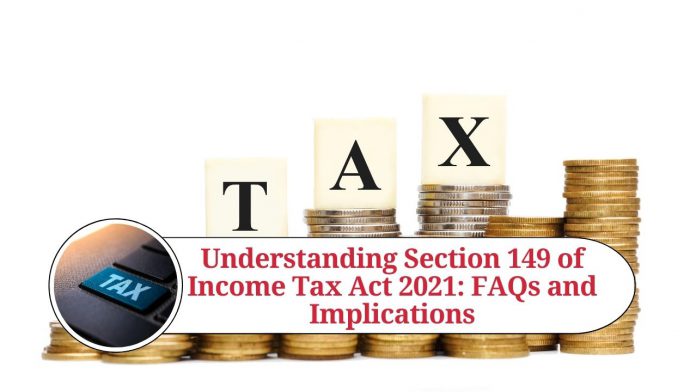Understanding Section 149 of Income Tax Act 2021
As a taxpayer, it’s essential to be aware of various sections of the Income Tax Act that affect your finances. One such section is Section 149 of the Income Tax Act 2021, which deals with the filing of returns by taxpayers. In this blog, we will explore the various aspects of Section 149 of the Income Tax Act 2021 and its implications.
Introduction to Section 149
Section 149 of the Income Tax Act 2021 mandates that every person whose total income exceeds the basic exemption limit must file an income tax return. The section specifies the types of taxpayers who are required to file a return, the due date for filing the return, and the consequences of failing to file the return.
Types of Taxpayers Covered under Section 149
Section 149 of the Income Tax Act 2021 covers various categories of taxpayers who are required to file a return. These include individuals, Hindu Undivided Families (HUFs), firms, companies, local authorities, and any other artificial juridical person.
Due Dates for Filing Returns
The due date for filing income tax returns for different categories of taxpayers is specified under Section 149 of the Income Tax Act 2021. For individuals and HUFs, the due date is 31st July of the assessment year. For companies and firms, the due date is 30th September of the assessment year. In case the taxpayer is required to get their accounts audited, the due date is 31st October of the assessment year.
Consequences of Not Filing Returns
Failing to file an income tax return can result in various consequences for the taxpayer. Under Section 234F of the Income Tax Act 2021, a taxpayer who fails to file their return within the due date may be liable to pay a penalty of up to Rs. 10,000. Moreover, the taxpayer may also be charged interest on the outstanding tax amount.
Conclusion
In conclusion, Section 149 of the Income Tax Act 2021 is a critical provision that mandates taxpayers to file their returns on time. As a taxpayer, it’s essential to be aware of the due dates for filing returns and the consequences of failing to file a return. By complying with Section 149, taxpayers can avoid penalties and interest charges and ensure smooth tax compliance
Other Related Blogs: Section 144B Income Tax Act
Frequently Asked Questions (FAQs)
Q. Who is required to file an income tax return under Section 149 of the Income Tax Act 2021?
Answer: Every person whose total income exceeds the basic exemption limit is required to file an income tax return.
Q. What are the types of taxpayers covered under Section 149 of the Income Tax Act 2021?
Answer: The types of taxpayers covered under Section 149 include individuals, Hindu Undivided Families (HUFs), firms, companies, local authorities, and any other artificial juridical person.
Q. What is the due date for filing an income tax return for individuals and HUFs under Section 149?
Answer: The due date for filing an income tax return for individuals and HUFs is 31st July of the assessment year.
Q. What is the due date for filing an income tax return for companies and firms under Section 149?
Answer: The due date for filing an income tax return for companies and firms is 30th September of the assessment year.
Q. What is the consequence of not filing an income tax return under Section 149 of the Income Tax Act 2021?
Answer: A taxpayer who fails to file their return within the due date may be liable to pay a penalty of up to Rs. 10,000 under Section 234F of the Income Tax Act 2021. Moreover, the taxpayer may also be charged interest on the outstanding tax amount.
Q. Is it mandatory to get the accounts audited for filing income tax return under Section 149?
Answer: The requirement to get the accounts audited for filing income tax return under Section 149 depends on the category of the taxpayer and their income level. For instance, companies and firms whose turnover exceeds Rs. 1 crore or Rs. 50 lakhs, respectively, are required to get their accounts audited.
Q. Can a taxpayer file a belated return under Section 149?
Answer: Yes, a taxpayer can file a belated return under Section 149 within the stipulated timeframe. However, the taxpayer may be subject to penalties and interest charges for filing a late return.




















